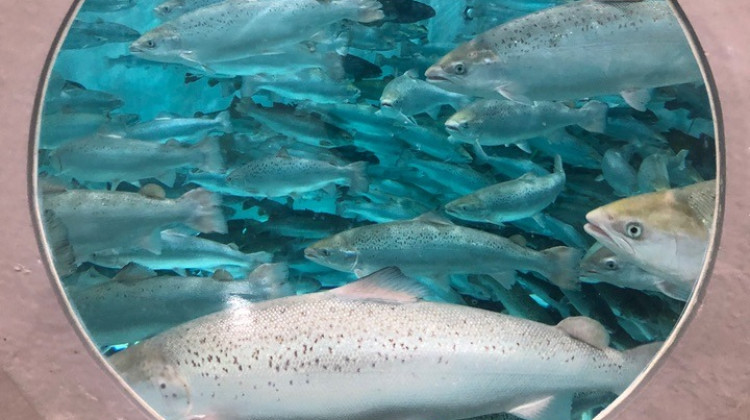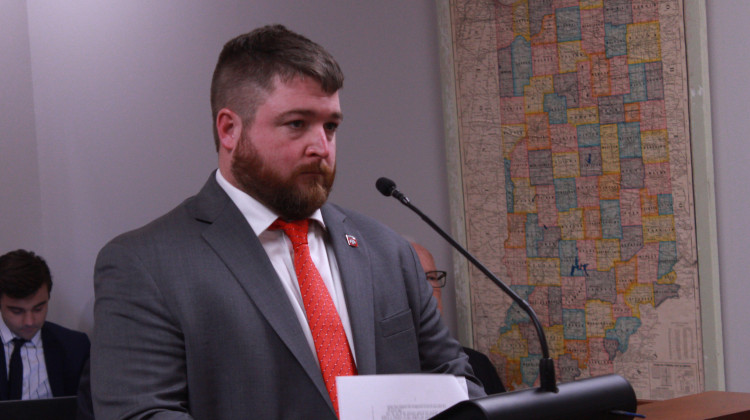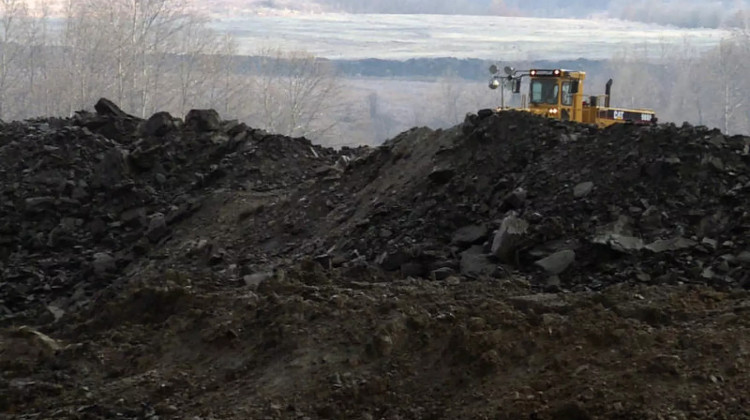
Wisconsin-based Superior Fresh acquired the former Albany, Indiana, AquaBounty aquaculture site in July 2024, but the company won’t produce genetically modified salmon.
Photo provided by Superior FreshAfter AquaBounty Technologies quietly retreated from its Indiana salmon farm last year, a Wisconsin aquaculture company is reviving the defunct facility with a new model — and different fish.
The Canadian biotechnology company, best known for developing AquAdvantage salmon — the first genetically modified animal approved for human consumption in the U.S. — shuttered its Albany facility in 2024 and exited the market entirely earlier this year.
The departure followed years of legal and public battles over transparency, labeling and ecological concerns associated with the genetically modified fish.
Now, the Delaware County farm is getting a second chance under new ownership.
Wisconsin-based Superior Fresh acquired the site in July 2024, but with a different approach.
Rather than genetic engineering, Superior Fresh is implementing regenerative farming practices that involve recycling fish waste as fertilizer; conserving water through closed-loop systems; and avoiding antibiotics, synthetic pesticides and genetically modified feed.
The goal, company officials said, is to raise healthy salmon while enhancing the land and water, not depleting them.
“We believe fish can be raised the right way — without shortcuts,” said Brandon Gottsacker, CEO of Superior Fresh. “This facility has good bones. It just needed a new direction.”
From GMO to regenerative farming
AquaBounty’s genetically engineered salmon was designed to grow faster than conventional Atlantic salmon by inserting genetic material from Chinook salmon and ocean pout. While the company touted it as a solution to global food insecurity, the product faced an uphill battle.
Major grocery chains like Kroger, Trader Joe’s and Walmart refused to sell the harvested fish. Environmental groups raised concerns about escape risks, labeling practices and consumer consent.
Raising genetically engineered salmon in the heart of the Midwest also presented logistical and environmental challenges. Critics dubbed the salmon “Frankenfish” and argued that AquaBounty’s model posed long-term ecological risks.
At the Albany facility, AquaBounty’s only U.S. site, environmental advocates flagged what they said were improper wastewater discharges and chemical handling violations.
Pushback continues against genetically modified salmon being raised at Indiana farm
AquaBounty denied wrongdoing, but a 2023 enforcement action from the Indiana Department of Environmental Management found the company in violation of its permit for discharging water containing elevated levels of phosphorus and ammonia.
The company paid a $7,800 fine to the state regulator to settle the violations and agreed to new terms in order to remain in compliance.
In early 2024, AquaBounty announced it would cease AquAdvantage salmon production entirely.
“AquaBounty’s decision to shut down is a victory for consumers, the environment, and wild salmon,” the Center for Food Safety said in a statement after the closure. “The company’s genetically engineered salmon were a direct threat to our native fish populations, and we are glad to see their risky experiment come to an end.”
Within months, Superior Fresh purchased the property for $9.5 million with plans to rehabilitate and transform the space.
AquaBounty declined to discuss its exit from Indiana. A spokesperson told the Indiana Capital Chronicle only: “AquaBounty is not doing interviews at this time. When we have things we can share, the company puts out a press release.”
The acquisition came as AquaBounty was under growing financial pressure elsewhere. The Canadian company faced ballooning costs tied to a never-completed Ohio facility, where construction stalled after estimated costs surged from $375 million to more than $500 million. The project was eventually abandoned, and AquaBounty auctioned off equipment earlier this year, leaving the site partially built and the Ohio town without the promised economic boost.
We believe fish can be raised the right way — without shortcuts.
– Brandon Gottsacker, CEO of Superior Fresh
Where AquaBounty relied on genetic engineering, Superior Fresh is sticking with traditional Atlantic salmon. Its fish are non-GMO, raised without antibiotics or synthetic pesticides, and fed a specialized diet designed to boost omega-3 content, Gottsacker said.
The company also intends to repurpose fish waste for soil restoration, mimicking its successful aquaponics model in Northfield, Wisconsin, where it also grows organic leafy greens in a connected greenhouse.
“We’ve had great success with our regenerative loop in Wisconsin,” Gottsacker said. “In Indiana, we’re starting with fish but building toward the same integrated vision.”
“In the U.S., local Atlantic salmon doesn’t really exist,” he added. “Superior Fresh is able to produce premium-quality salmon right here in the Midwest, dramatically reducing the time, distance, and environmental impact it takes to get salmon to our dinner table.”
A slower, ‘cleaner’ model
When Superior Fresh acquired the Albany facility, just one employee remained, Gottsacker told the Capital Chronicle. Within months, the company had hired more than 20 staff, including some former AquaBounty workers and new hires from Indiana’s agricultural workforce. Contractors have been sourced locally to carry out facility upgrades.
The new operation focuses on water conservation and waste reduction. Gottsacker said his company reduced the need for new water by more than 80% and improved discharge systems in line with IDEM permits.
Unlike AquaBounty, which emphasized rapid growth and production, Superior Fresh is taking a slower, “more intentional” approach, Gottsacker continued. The company expects its first Indiana harvest in 2026 and is targeting local and regional markets to reduce transportation emissions and offer a fresher, more sustainable product.
“We’re not rushing to market,” Gottsacker said. “We’re building something that can last and contribute to the local food system in a meaningful way.”
“We’ve chosen a path that few are willing to take,” he continued. “Every decision we make — from the feed we choose to the way we farm — is grounded in our unwavering commitment to quality, integrity, and purpose.”
Indiana’s new protein politics
The relaunch of the facility comes amid a push by Hoosier lawmakers to regulate the future of “alternative” proteins.
In May, Gov. Mike Braun signed a new law banning the manufacture and sale of cultivated, or “lab-grown,” meat in the state for two years. The moratorium, which took effect July 1, also mandates that any future cultivated products be labeled as “imitation meat” or face fines of up to $10,000 per violation.
Supporters say the law protects consumers and traditional farmers. Critics argue it limits innovation and could deter new food technology investment in Indiana.
Gottsacker said Superior Fresh doesn’t plan to use biotech modifications or reengineer fish. Instead, the company aims to farm “as nature intended” by prioritizing animal welfare, ecosystem balance and full supply chain transparency.
“People want to know where their food comes from,” Gottsacker said. “We’re here to show them.”
Indiana Capital Chronicle is part of States Newsroom, a nonprofit news network supported by grants and a coalition of donors as a 501c(3) public charity. Indiana Capital Chronicle maintains editorial independence. Contact Editor Niki Kelly for questions: info@indianacapitalchronicle.com.
 DONATE
DONATE






 Support WFYI. We can't do it without you.
Support WFYI. We can't do it without you.